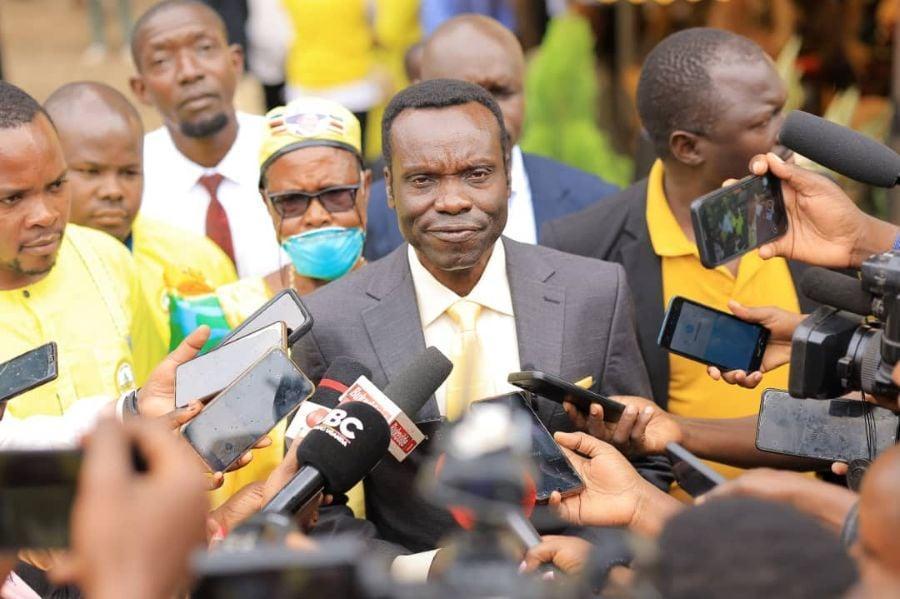Africa-Press – Uganda. In Uganda’s evolving political landscape, it is not uncommon for ambitious actors to mount bold challenges against established names. However, there is a fine line between strategy and miscalculation—a line that David Calvin Echodu now risks crossing.
Echodu, a businessman-turned-politician, has thrown himself headfirst into two simultaneous contests: one for the National Resistance Movement (NRM) Vice Chairperson for Eastern Uganda—a seat currently held by the politically entrenched Capt. Mike Mukula—and the other for Soroti City West Division MP, a race he narrowly lost in 2021 to the independent candidate Jonathan Ebwalu.
On the surface, the two battles may seem unrelated. In reality, however, they are intertwined by a political calculus that could prove costly.
At the heart of Echodu’s maneuver is a gamble that he can use the high-profile NRM Central Executive Committee (CEC) contest as a springboard to boost his local political standing in Soroti. His reasoning is straightforward: By challenging Mukula, he gets visibility and forces his name onto the lips of voters and powerbrokers alike. Whether he wins or loses at CEC, the exposure might stiffen his political collar enough to appear as a serious contender in the 2026 parliamentary race.
But this is a dangerously narrow reading of the political map.
Mukula is no ordinary opponent. A long-time power broker in Teso and Eastern Uganda, he commands deep-rooted loyalty within NRM structures and beyond. His influence stretches from the party’s grassroots to its uppermost echelons.
To many in Teso sub-region, he remains a political custodian, having invested years in building networks and brokering power deals. Challenging him isn’t just a contest of ideas—it’s a direct affront to an institution.
For many NRM loyalists in the region, Echodu’s bid smacks of youthful arrogance and political opportunism. The risk here is not merely that he could lose the CEC race—though that remains highly probable—but that he could alienate Mukula’s broad support base in Soroti and the greater Teso sub-region.
For voters and political actors in this region, loyalty is a high currency, and going against a household name like Mukula may be seen as betrayal.
This political misstep could cost Echodu dearly in his more realistic battle for the Soroti City West seat, which pits him once again against Jonathan Ebwalu.
Unlike Mukula, Ebwalu may not have a decades-long political résumé, but he is no pushover. Since his election in 2021, Ebwalu has entrenched himself in Soroti’s political fabric and positioned himself as an ally of Speaker of Parliament Anita Among, whose growing political sway in Teso cannot be underestimated. Among’s influence has steadily risen across Eastern Uganda, and she has been actively expanding her networks by rallying MPs and key district figures under her wing.
Thus, Echodu is inadvertently positioning himself between two formidable political forces: Mukula’s old guard and Among’s emerging power bloc.
While Echodu focuses his energy and resources on the symbolic, high-risk CEC race, Ebwalu remains largely unshaken, quietly consolidating his grassroots base, leveraging his parliamentary networks, and enjoying the tacit endorsement of Among’s formidable machinery.
Echodu’s double-race strategy also poses another threat: resource depletion. Campaigns for CEC seats are notoriously expensive. They involve traversing the entire Eastern Uganda region, greasing local party structures, organizing mass rallies, and sustaining media visibility.
Even seasoned politicians have been known to run into financial strain during such races. For an upstart like Echodu, who still needs to fund a vigorous parliamentary bid afterward, this could stretch his political and financial resources dangerously thin.
In the end, what Echodu risks is a scenario where he loses both contests—first, the CEC race where Mukula is widely expected to triumph, and later, the parliamentary race where Ebwalu’s incumbency, coupled with Among’s regional influence, could leave Echodu politically stranded.
If he loses the CEC race—and with it, the goodwill of Mukula’s loyalists—he will likely limp into the Soroti City West campaign already weakened, both politically and financially. In Soroti politics, such bruises rarely go unnoticed.
Ultimately, Echodu’s gambit reflects a common pitfall among ambitious political newcomers: mistaking visibility for viability. Politics, especially in Uganda’s fluid environment, requires a careful reading of not just the terrain, but also the weight of the players involved. By aiming for two mountains at once, Echodu risks slipping through the cracks of both.
As things stand, his double-edged strategy may end up being less a masterstroke and more a cautionary tale.
For More News And Analysis About Uganda Follow Africa-Press






